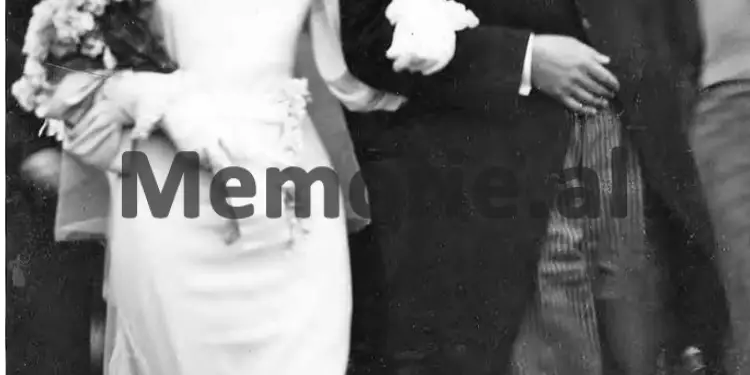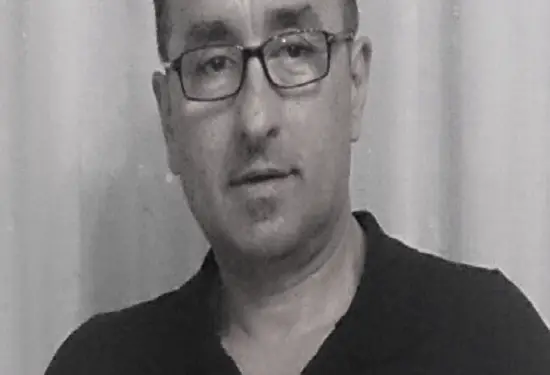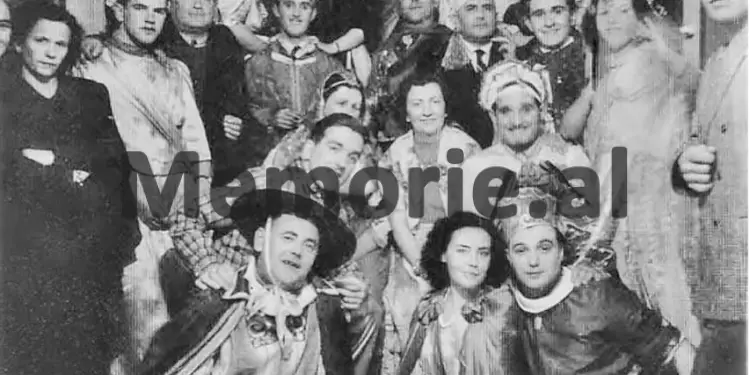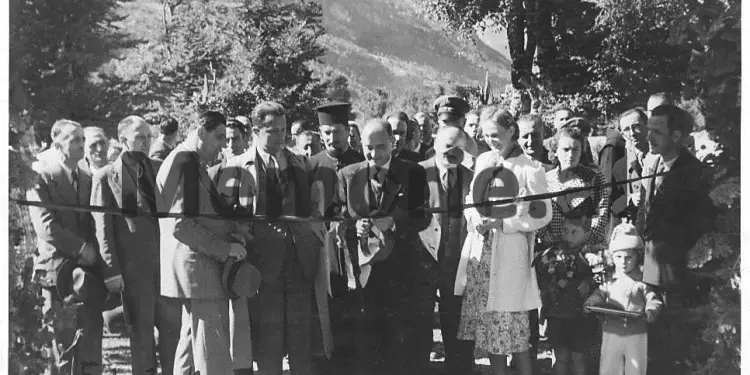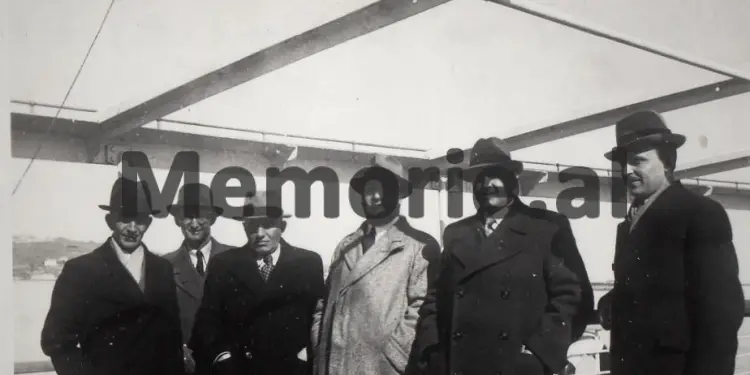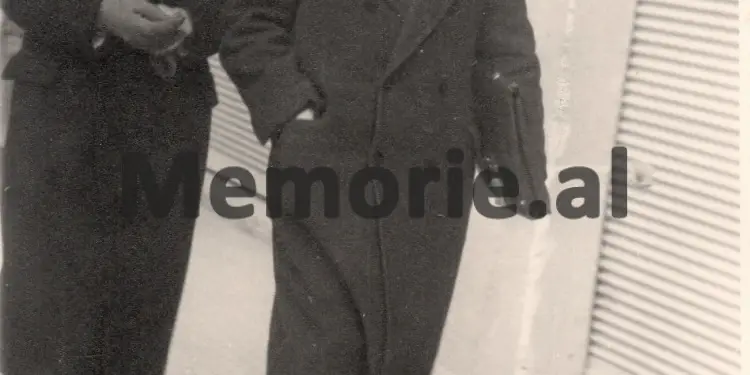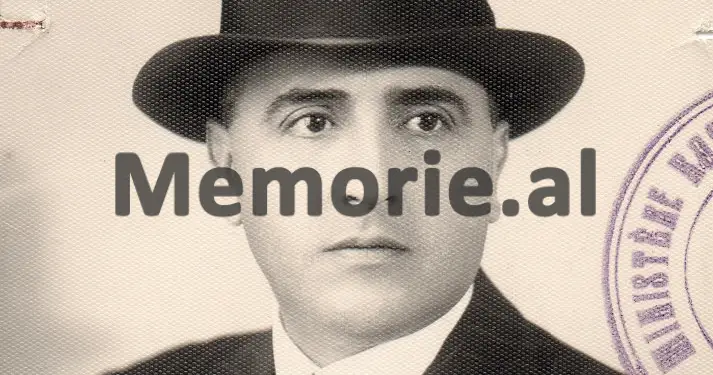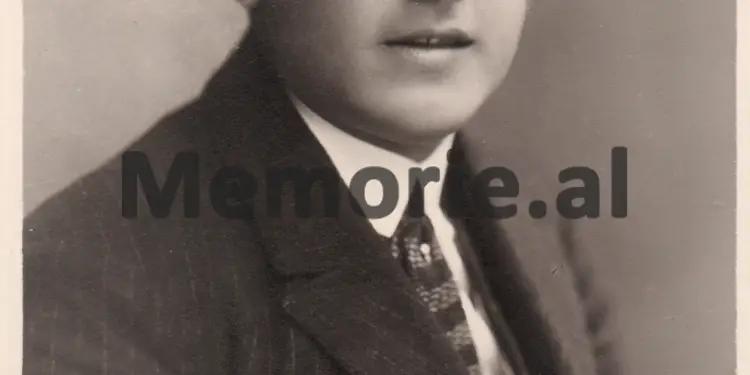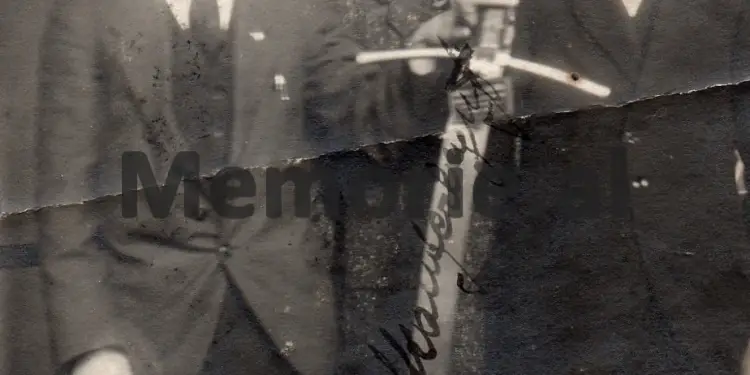By Arben Pustina
The seventh part
-Rrok Gera, a proper statesman –
FORWARD
Memorie.al / This book aims to convey to the public the image of a perfect man, who lived in other times, but who was the best example, not only of what an ordinary man can represent, but, next first, as an example of a noble, distinguished, omniscient and, above all, honest statesman. Having in his genes the noble virtues of his origin, being formed as a personality in a wonderful environment, such as Shkodra at the beginning of the 20th century, and graduating from one of the most prestigious universities in Europe, such as that of In Vienna, Rrok Gera had all the potential to be one of the important figures who gave rise to a rapid development through comprehensive reforms in Albania in the 30s of the last century.
This development reached its peak with the government of Mehdi Frashër, considered perhaps the best Albanian government of all time, formed for the most part by non-political persons, among who was Rrok Gera. For 10 years, or more, as a minister or in other high state functions, he worked with conviction that he was walking on the right path for the consolidation of the Albanian state, a process for which he said he had no time to lose. Economist, financier, diplomat, lawyer, Gera was a specialist who advanced towards the top with his professionalism in an environment where the old factions, which were almost dominant in politics and governance, lost ground in front of young and educated people good.
Continues from the previous issue
RETURN TO ALBANIA AND ACTIVATION IN THE STATE ADMINISTRATION
These indicators and the exceptional stability of the Albanian franc in general, more than the credit of the National Bank of Albania, were the result of the dedication of the Albanian financial authorities, including Rrok Gera. Contacts on work issues between Gera and representatives of Italian capital in the Central Bank of Italy, or the Bank of Italy, such as Amedeo Gambino, Gaudenzi, Ettore Meliss, Bressan, etc., were quite frequent and in archives, or studies of an economic and financial nature, are found numerous exchanges of letters and references to these meetings, where Gera was described as: “Ministro Gera”, “H.E. Gera”, “Eccellenza Gera”, “signor Gera”, “Dott. Gera” or simply “il Gera”. In a letter dated November 15, 1935, Ettore Meliss wrote to Gambino, emphasizing that, as the latter could have ascertained himself, Dr. Gera was a person with a completely different mentality from other Albanian personalities.
As an illustration of this (at least as far as strong character and determination is concerned), we have a letter dated 25.07.1936, where the Central Directorate of the BKSh, based in Durrës, wrote to Gambino in Rome that, while Prime Minister Mehdi Frashëri had urgently forwarded 16 economic and financial projects to the State Council (which he had also distributed to the press), reliable sources claimed that the Minister of Finance, Rrok Gera, had sent a letter to the Prime Minister and a copy her letter to the Council of State, where she stated that she did not agree with the Prime Minister regarding the projects in question and argued that, in such a situation, they could not be considered.
In fact, this letter really existed and basically contained Gera’s opposition, especially to Prime Minister Mehdi Frashëri’s project for the modification of the tithe tax. With the letter dated 22.07.1936, with no. 251/I Res., Rrok Gera brought to the attention of the Prime Minister that he was against the initiative for the suppression of the law on the conversion of the tithe into a tax in money, since this law was made in order to ease the burden of the farmer, to avoid the vices of the tithe, to increase production and, in general, to eliminate the moral and material damages that the tithe system had once brought. After emphasizing that the villagers were very satisfied with the cash tax system and there was a lot of evidence for this, for which he was even personally informed in the villages, Minister Gera underlined, among other things, that: “… the precautionary measure of Your Excellency, with the introduction of the tithe even for the villages that have opted to pay the tax in cash, it does not seem to me to be legal and fair”.
In this context, Rrok Gera declared that he himself had worked for 5 years for the drafting and approval of the law in question and now even his conscience did not allow him to accept now something, against which he had fought so hard once:… “The head of this Ministry has fought for 5 consecutive years in his capacity as General Secretary, the land system, until a Minister of Finance was found who understood the importance of the issue. And how would he justify himself in front of his conscience now as Minister, by introducing again the land system, which he has condemned and continues to condemn so much”? Even further, Minister Gera presented in his letter, a number of reasons and analyzes of financial and economic factors, reaching the conclusion that, precisely for all these reasons, he could not accept the Prime Minister’s project. As for the reform in this area, the Minister of Finance promised that, very soon, he would present the draft law on the implementation of the Cadastre and the one on the application of a very low tax on land, in those areas where the payment of the tithe in cash was suppressed.
Also, Gera promised that, in order to increase the income of finance, he would look for roads and other means. On the eve of the harvest season, in the spring of 1936, the Ministry of Finance had considered taking measures to prevent speculation in grain prices. Regarding this issue, in a justifying report to the Parliament, on March 11, 1936, the minister Rrok Gera suggested that the government have at its disposal a quantity of grain, exercising its right to purchase from abroad, but, being at the same time careful that the quantities of cereals were not so large as to cause a reduction in the price, since in this way the interests of the producers would be harmed. After noting that the actions of buying and selling grains were expected to be quite difficult if they were implemented by the usual bodies of the state administration, Rrok Gera proposed that the Institute of Grains, which had been established not long ago, should deal with this activity. And so it was.
In its meeting held in March 1936, the Parliament approved word by word the draft law “On influencing the price of wheat and corn”, through which the Grain Institute was authorized to buy wheat and corn from abroad, subject to customs duties excluded. Based on the already approved draft law, the sale prices of cereals purchased by the Institute were set at fr. gold 15 and fr. gold 12 per quintal, respectively for wheat and corn. It was also foreseen that sales would be made to consumers in cash and in quantities of not less than 1 quintal and not more than 25 quintals. The simple profit, realized from this activity of the Grain Institute, would be poured in favor of the capital of the National Agricultural Bank. In March 1936, the Ministry of Finance considered the request of the Alcohol Factory in Vlora, for the exemption from the consumption tax of a quantity of alcohol planned for export to Italy.
In the justifying report dated March 15, 1936, forwarded to the parliament on the matter in question, Minister Gera explained that the Ministry of Finance had investigated and had come to the conclusion that the Alcohol Factory in Vlora really intended to export alcohol, so it had examined the request for abolition of the consumption tax and had accepted it. Meanwhile, the Ministry had foreseen that the export of alcohol would be done under the supervision of Finance and with a special permit, leaving a sufficient guarantee, equal to the value of all relevant taxes, in case the export of alcohol was not proven within the deadline specified and with the relevant documents defined according to the law. Also, in March 1936, Minister Rrok Gera reported to the Parliament that the law of April 22, 1933, for raising the tax on cigarette papers from fr. gold 0.0176 for each notebook, in fr. gold 0.1216, had not worked.
Based on statistics, Gera noted in his report that with the increase in the tax on cigarette paper to the extent of almost 75%, the income had increased very little, while the consumption of cigarette paper had decreased by 45%. According to him, this decrease did not seem to be effective, but was related to the contraband consumption and the consequences of the crisis that reduced the purchasing power of the consumer, who was forced to use illegal ways to purchase consumer goods, in this case cigarette paper. In order to eliminate these phenomena, the Minister of Finance proposed to reduce the cigarette paper tax: “In order to adapt to the consumer’s purchasing power and thus avoid any attempt at smuggling (which is not only harmful to the State Treasury, but it is also an injustice to the honest consumer), in addition to other measures we have taken, we saw the way to draft the draft law that is presented to you for consideration and approval, with which the letter tax cingarit comes from fr. gold 0.1216, in fr. gold 0.0716…”.
On April 1, 1936, Rrok Gera submitted to the parliament the relevant report on the “Preventive budget law project for the financial exercise 1936-1937″. According to him, the budget provided for an expenditure of fr. gold 19,104,183, while the income was expected to reach the amount of fr. gold 18,584,042, with a passive surplus of fr. gold 520,141. In detailing his report on the 1936-1937 preventive budgets, Gera noted that this budget was not expected to have any changes from the previous one. By closely linking the review of the projected budget with the progress of the budgets of the past years, the Minister of Finance noted that the deductions that had been made from time to time among the expenses of different administrations, in close connection with the deduction of income, in recent years had created a balance, which constituted one of the main guarantees for the stability of the financial situation.
As proof of this, Gera emphasized the positive fact that financial inactivity in the last two years had not increased, and had even decreased, albeit to a small extent. However, the Minister of Finance stated that, in the preparation of this budget, the government had preferred to be careful not to exceed expenses, but this did not mean that requests for additional funds would not be accepted later, where deemed necessary: …”The government, loyal to such a direction, in order to better protect the interests of the State, wanted to present a budget without a deficit, but on the other hand, it could not take another path, but with future proposals beyond the possibility of realization, or assign an initial passive surplus, according to its opinion. So the Government has seen the way, let’s follow the second way and thus present the real situation to the Parliament and the country.
After a detailed examination of the income realized during the past exercises and the development of the extractions that we have during the traveling exercise, the Government has a complete conviction that if the anticipated amount of income in fr. gold 18,584,000, would be very dangerous, therefore he did not want to avoid that amount, which today can be considered a real income…”. Mehdi Frashëri’s government thought that it was important for the economy to promote domestic production, even in specific sectors, as we will see below. In this context, the Ministry of Finance had prepared a draft law that provided for an increase in the tax on husked rice coming from abroad, as well as an increase in the tax on radio sets that were imported assembled. Arguing the measures in question in parliament, Minister Gera emphasized, on April 6, 1936, that the fields in Albania had a good tradition in the production of rice and the area planted with this crop could be increased, given that rice was an important part of food of the population.
As for the MPs’ concern that this could affect the increase in malaria cases, the minister promised that the necessary measures would be taken to prevent the possible damage from this disease. Basically, the idea of increasing the tax on stripped rice was aimed precisely at increasing the area planted with rice in the country and stripping it with the country’s machinery. Likewise, even for assembled radios, the import tax was doubled, but for unassembled ones the tax remained stationary, and also, the tax for each bulb, as the main component of radios of that time, remained low. Arguing the measure in question, Rrok Gera emphasized that it was important to encourage the activity of the country’s technicians, who, in addition to earning something with their trade, would also offer the possibility for radio sets to be repaired in the country, since until at that time, a broken radio had to be sent out for repair.
In April 1936, the Ministry of Finance presented another draft law to the Parliament, which required authorization for the sale of some state properties. It was mainly about debtors’ properties, which were transcribed in favor of the state, but also about other state properties, which required significant amounts for maintenance, but which brought much less income. In the discussion held in the parliament regarding this draft law, Minister Rrok Gera requested the support of the deputies for its approval; as otherwise, there would be consequences for the country’s finances. Here he was referring to the forgiveness of arrears by the state for a number of debtors whose assets had been transcribed in favor of the state, but whose return could be demanded in the meantime. For the sale of these state properties, Gera noted that a commission would be set up, which would determine a basic value and sell the property to whoever would offer more than this value.
On 28.10.1936, the Minister of Finance requested from the legislators the employment of three experts in order to make the new accounting system work better and especially for the drafting of consumption budgets, which had managed to be compiled until 1931 and no further, due to the lack of competent personnel. For this, Gera clarified that this lack of specialized personnel was felt more in the Ministry of National Economy and Education. Minister Gera, who was present at the parliamentary discussions, answered the MPs who raised concerns that the state’s expenses were increasing: “…I tell you, sir, that before I issue such an act, I weigh it well because it hurts me a lot I will pay the state expenses, but I was forced to take this out, because it seems to me that the service is much more valuable, it is worth more than the expenses that the state will pay…”.
In another debate in the parliament, in the summer of 1936, there was discussion about hiring a chemistry specialist, about whom a noise had been made in a newspaper article, and in this spirit, there was also a debate in the parliament. Present at the plenary session of the parliament, Gera dismissed any possibility of abuse for employment in the department he headed and meanwhile explained to the deputies that it was about one of the few specialized chemists in Albania, whose employment was necessary. in order to draft a valid draft law for suitable taxation for the producers of alcoholic beverages. Touched by the manner of the debate, Rrok Gera was firm in his arguments: “If it is claimed that the Albanian State has decided not to create civil service, then it can be said that it has decided not to advance when. Do not create offices that are not necessary, but do not create offices that are necessary. If it turns out that this office is not necessary, I was the first to let this office go, I am fully convinced that it is necessary and productive and I ask the Chamber to accept it…” .
Further, Minister Gera clarified the technical aspect of the draft law: “… In the issue of alcoholic beverages, we have more or less an anomaly, that we have adapted the system of sealing the cauldrons. Based on this system, those who produce alcoholic beverages require the unsealing of the cask; this is done regularly and the substance from which the alcoholic drink is extracted is recorded, but the competent bodies are not able to check if these cauldrons were closed at the appointed time. For the story; a person who shows a quantity of substance for alcoholic beverages and asks to unseal the cauldron, there may also be a quantity of other hidden substance, and when we are not in a position to control whether the cauldron is closed at the appointed time, this can produce the quantity of it is hidden and thus the purpose of taxation is not preserved. When there are no people to check the resealing of casks, as well as people to check the density of alcoholic beverages made from grapes, or sugar, as I said, then the purpose of taxation is not preserved.” Memorie.al




